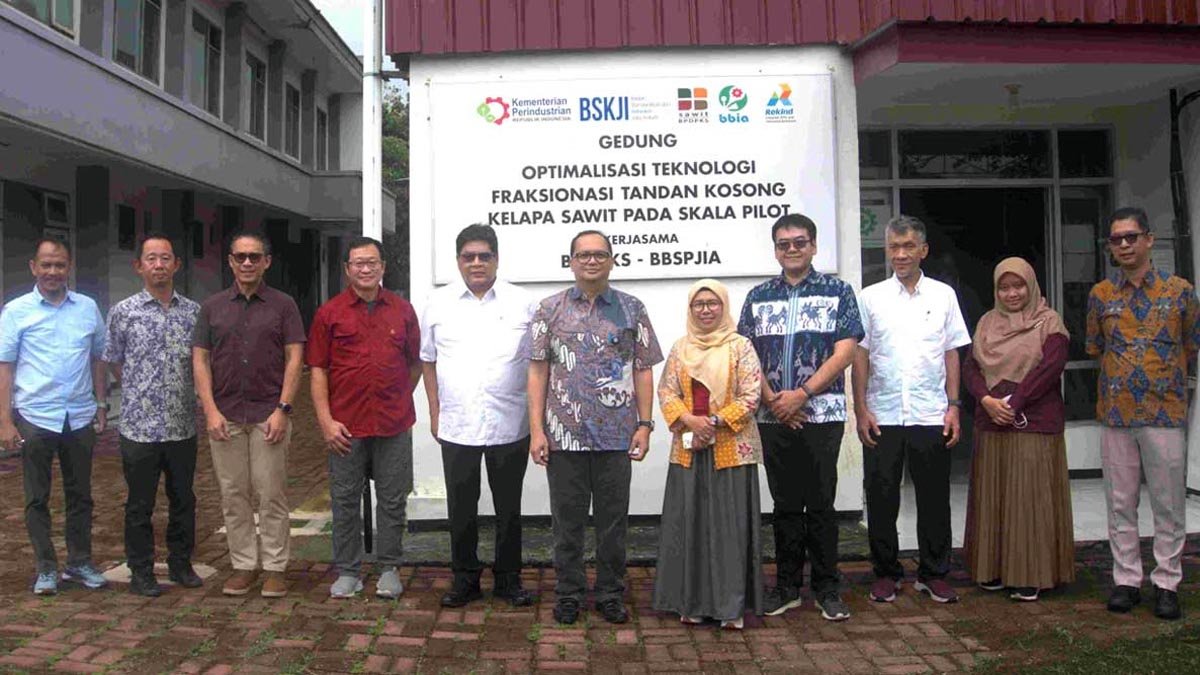PALMOILMAGAZINE, JAKARTA – The Indonesian government has once again reaffirmed its commitment to accelerating the transition toward green energy. The Ministry of Industry (Kemenperin) is now focusing on utilizing empty fruit bunches (EFB) from oil palm as a raw material for bioethanol production through glucose extraction. This strategic initiative is expected not only to expand the use of palm oil waste but also to strengthen Indonesia’s position in the global renewable energy market.
Minister of Industry Agus Gumiwang Kartasasmita emphasized that the success of environmentally friendly technology development depends on cross-sector collaboration. “To achieve this goal, synergy between the government and industry is essential. We are confident that collaboration is one of the keys to delivering sustainable technology,” he stated in an official release received by Palmoilmagazine.com on Wednesday (Sept. 17, 2025).
This initiative has been translated into concrete action through cooperation between the Center for Standardization and Industrial Services for Agro-based Industries (BBSPJIA) and PT Toyota Motor Manufacturing Indonesia (TMMIN). The project also involves PT Rekayasa Industri and Institut Teknologi Bandung (ITB) as strategic partners in renewable energy technology development.
Also Read: Global Policy, Local Impact: Indonesian Women Smallholders Voice Concerns over EUDR in Brussels
Andi Rizaldi, Head of the Agency for Standardization and Industrial Services Policy (BSKJI), highlighted that close collaboration among government institutions, research bodies, and industry forms the foundation for green innovation. “We are fully committed to supporting the development of standards and industrial services that can drive the transformation of industry toward greater competitiveness while remaining environmentally conscious,” he said.
High Value from Palm Oil Waste
EFB has long been seen as low-value waste with limited uses. However, through BBSPJIA’s EFB Fractionation Pilot Plant, this by-product can now be processed into high-value outputs such as bioethanol, glucose, xylose, lignin, and their derivatives.
Yuni Herlina Harahap, Head of BBSPJIA, explained that the pilot plant serves as both a research hub and a testing ground for technologies that support industries in maximizing palm oil waste utilization. “This pilot project is expected to drive the development of sustainable palm-based bioenergy, while also opening opportunities for further research on biomass as a source of environmentally friendly energy,” she noted.
The initiative also aligns with circular economy principles. According to Bob Azam, Vice President Director of PT TMMIN, bioethanol derived from EFB can serve as a model for more productive use of industrial waste. “We see bioethanol not only as an alternative energy source but also as part of a circular economy approach that reduces environmental impact while increasing the added value of Indonesia’s palm oil industry,” he said.
Bob also praised BBSPJIA’s role in delivering tangible technological solutions. “We are committed to supporting initiatives that accelerate Indonesia’s transition toward a green economy,” he added.
Strengthening National Competitiveness
The Ministry of Industry stressed that this cross-sector partnership is not just about research and technology but also about building long-term strategies to strengthen national industrial competitiveness. With regulatory support, research infrastructure, and active participation from businesses, Indonesia is expected to advance more rapidly in addressing energy and environmental challenges.
“We are confident that Indonesia can move toward a sustainable and highly competitive green industry. This initiative is clear proof that innovation and cross-sector collaboration can bring positive change while driving inclusive and environmentally friendly economic growth,” Yuni concluded. (P2)
